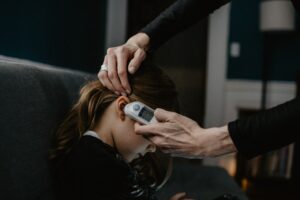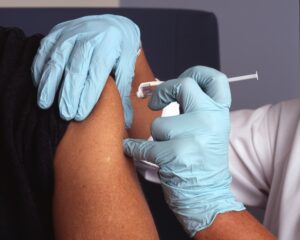Health officials have offered some simple advice to help parents keep their children healthy amid concerns about back-to-school illnesses this January.
 As the new school term began, parents were encouraged to take 5 simple steps to help stop the spread of germs and keep their children and the wider community, including vulnerable individuals, as healthy as possible.
As the new school term began, parents were encouraged to take 5 simple steps to help stop the spread of germs and keep their children and the wider community, including vulnerable individuals, as healthy as possible.
The winter season can see a significant spike in common illnesses such as chickenpox, norovirus and flu, which can prevent children from heading into school in the New Year.
The advice from health officials comes amid wider concerns about rising school absences, and at a time of year when children are most likely to miss their lessons.
Dr Catherine Falconer from the UK Health Security Agency (UKHSA) said that these and other common seasonal viruses can “disrupt children’s education and cause more serious illnesses,” but that there were steps parents could take to stem the tide of back-to-school illnesses.
These include:
-
Following and teaching good hygiene habits
 Viruses can live on our hands so practising good hygiene, including regular handwashing, is one of the most effective ways to stop them from spreading. You should use soap and warm water for a minimum of 20 seconds or hand sanitiser in order to clean hands properly. Meanwhile, tissues should be used to catch coughs and sneezes and then disposed of in the bin immediately afterwards. Handwashing should be repeated after using a tissue.
Viruses can live on our hands so practising good hygiene, including regular handwashing, is one of the most effective ways to stop them from spreading. You should use soap and warm water for a minimum of 20 seconds or hand sanitiser in order to clean hands properly. Meanwhile, tissues should be used to catch coughs and sneezes and then disposed of in the bin immediately afterwards. Handwashing should be repeated after using a tissue.
-
Help stop the spread of stomach bugs
If children become ill with diarrhoea and vomiting, use bleach-based products to clean surfaces in order to kill germs and prevent them from spreading. If you experience symptoms of sickness bugs, such as norovirus and E.coli, avoid preparing food for other people until 48 hours after symptoms stop.
You should also avoid visiting any vulnerable people in care homes and hospitals if you or anyone in your household is poorly with diarrhoea and vomiting. Those affected by symptoms should not return to work, school or nursery until two days after the symptoms have gone.
-
Keep your child at home when necessary
 Although school absences are a concern, it is still important to recognise when you should keep your child home from school or nursery. Children should remain at home if they have a high temperature and are unwell. Any children with diarrhoea and vomiting, should, as stated above, remain at home until 48 hours after symptoms have passed to prevent viruses from spreading to others. But children who simply have regular winter cold symptoms such as a runny nose, sore throat or slight cough are encouraged to continue attending school, nursery and childcare as long as their temperature remains normal.
Although school absences are a concern, it is still important to recognise when you should keep your child home from school or nursery. Children should remain at home if they have a high temperature and are unwell. Any children with diarrhoea and vomiting, should, as stated above, remain at home until 48 hours after symptoms have passed to prevent viruses from spreading to others. But children who simply have regular winter cold symptoms such as a runny nose, sore throat or slight cough are encouraged to continue attending school, nursery and childcare as long as their temperature remains normal.
Other viruses which often peak at this time of year include scarlet fever and chickenpox. Scarlet fever symptoms include:
- Flushed cheeks
- A bumpy rash on the tummy
- A strawberry-like tongue
- Swollen neck glands
- Fever
- Sore throat
If you suspect your child has scarlet fever, you should contact your GP. Children should remain off school and nursery until 24 hours after the first dose of antibiotics have been received.
Chickenpox is another of the highly contagious back-to-school illnesses. It causes an itchy, spotty rash and can make children feel pretty rotten.
Health officials say that children should be kept away from school, nursery or other childcare environments until all of their spots have crusted over. If you or your child has chickenpox, you should avoid also visiting any newborn babies or pregnant people who have not had the virus before, as it can cause complications for these groups.
-
Ensure children are up to date with their immunisations
 Children can receive a “quick and painless” nasal spray vaccination to help protect them against the flu virus. The UKHSA says that vaccine uptake among preschool children is lower than other groups, despite the illness sometimes proving more serious for children in this age group. They have urged parents to find out if their child is eligible for the flu vaccine and to ensure they receive it, if so.
Children can receive a “quick and painless” nasal spray vaccination to help protect them against the flu virus. The UKHSA says that vaccine uptake among preschool children is lower than other groups, despite the illness sometimes proving more serious for children in this age group. They have urged parents to find out if their child is eligible for the flu vaccine and to ensure they receive it, if so.
The uptake of other important childhood vaccinations which protect against serious diseases, such as measles, mumps, rubella, diphtheria and polio, has also dropped off in recent years. Health officials urge parents to ensure that their children are up to date with all their vaccinations to give them the best possible protection against these potentially nasty illnesses, which could have lifelong effects.
-
Seek out health advice from trusted NHS sources
The NHS provides a wealth of evidence-based advice for parents to help them navigate back-to-school illnesses and protect their children through common sense measures. Advice available online includes:
- Is my child too ill for school?
- NHS vaccinations and when to have them
- High temperature (fever) in children
- Check if it’s chickenpox
Training for the health, safety and welfare of children
First Response Training (FRT) is a leading national training provider delivering courses in subjects such as health and safety, first aid, fire safety, food safety, mental health, health and social care, safeguarding and more.
They work with a large number of early years and childcare providers, as well as schools, colleges, and children’s services. Their courses include Health and Safety for Child Carers, Risk Assessment for Child Carers, Safeguarding Children, Infection Control and Emergency Paediatric First Aid.
Paediatric first aid training courses include details of how to identify and respond to many common childhood illnesses.
A trainer from FRT says:
“Children are returning to the classroom after their Christmas holiday and hopefully they are feeling excited to see their friends and resume their lessons. But germs are on the rise at this time of year and back-to-school illnesses can strike.
“It’s important to remember that most children will only experience mild colds or maybe a brief stomach bug, but it’s still important to do what we can to minimise the spread of germs and keep children healthy and safe.
“These common sense tips from health officials can help parents understand what to do to prevent the spread of infection, when to send their children into school or nursery and when it is appropriate to keep them at home.”
For more information on the training that FRT can provide, please call them today on freephone 0800 310 2300 or send an e-mail to info@firstresponsetraining.com.
